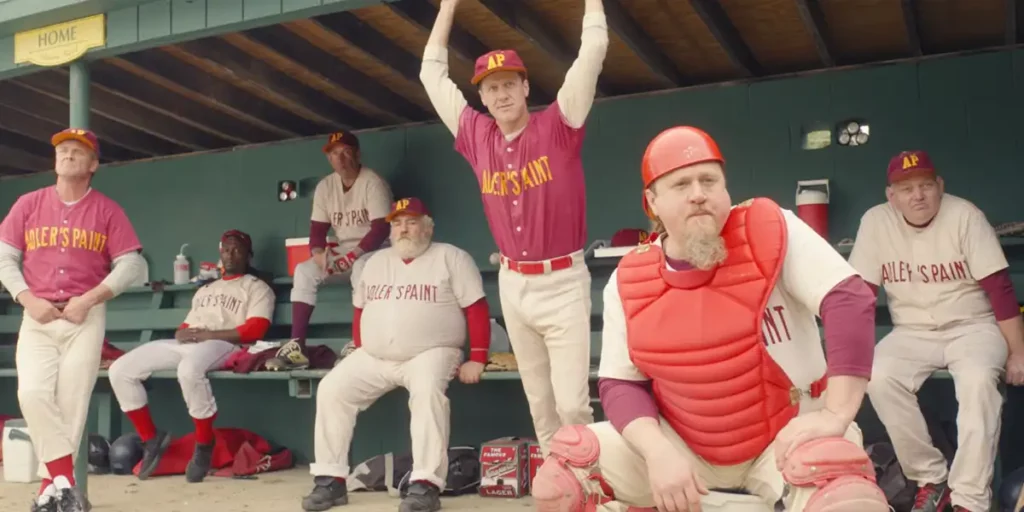With humour and insight, Carson Lund paints a vivid portrait of Americana in flux in baseball gem Eephus.
Director: Carson Lund
Genre: Comedy, Drama, Sports
Run Time: 98′
Cannes World Premiere: May 19, 2024
U.S. Release: March 7, 2025 (limited) / March 14 (wide)
U.K. Release: TBA
Where to Watch: In select US theaters, with expansion to follow
It is remarkable how we can let a hobby define us. Whether a craft, a project or a sport, these outlets give us respite from the rat race, inspire us to create works we’ve dreamed of for years, and can create friend groups we never could have imagined (To wit, this writer has been talking about films for far too long, and still loves it, but I digress). As a filmmaker, Carson Lund understands this. For his debut feature as director, the indie baseball comedy Eephus, he also co-wrote, co-produced, edited, and worked on the soundtrack.
Our passions can mean the world to us, and Lund uses his debut to explore what happens when an outlet for those passions gets taken away. For all the brawny energy it brings, Eephus mourns the passing of tradition in subtle but potent ways.
It’s Sunday afternoon; what else is anyone gonna do but play ball? A windswept baseball diamond in a small Massachusetts town is the crucible in which Eephus will play out. Two teams (Adler’s Paint in red and white, the Riverdogs in blue and white) will fight for the glory of triumph. Or they’ll knock some balls about, talk about how much their jobs suck, and generally try to enjoy themselves while their families and random onlookers cheer (or jeer). Eephus has no interest in titles being won. Playing like a Richard Linklater adaptation of a Garrison Keillor novel, Eephus is an ensemble piece about the end of an era. The diamond, named Soldier’s Field, is about to be cleared and a new school is to be built on the site. The men who populate the two teams are not impressed, but we understand why. As Eephus makes abundantly clear, this is their primary social outlet, their oasis of joy in the maelstrom of suburban life.
An eephus is curveball that can take the man at the bat by surprise by how slow and boring it can be. Eephus is not an eephus, but its setting seems defined by its slow patient atmosphere. Not much happens in towns like this, so it’s up to the locals to fill the spaces with chatter and activity. Lund’s script is a delightful portrait of suburban life, with his own background growing up in nearby New Hampshire informing the dialogue and characters. It frequently and hilariously stresses these men are not athletes (“The worst part of this sport is the running”), but admires their commitment to their chosen sport, and their enjoyment of it. Baseball is a game that is not defined by timekeeping; these men will play this game as long as they have to. Their interplay is naturalistic, fusing humour with regrets about their gameplay, the playing field and their own lives.
It’s a testament to Lund’s ability that we get sucked into the world of Eephus. There’s plenty of baseball terminology flying around, but it never gets overly complicated for a viewer with no knowledge of the game. Regardless of what’s being said, the player’s feelings are etched on their faces and displayed in their tempers and howls of laughter. The cast are mostly unknowns, which helps sell the feeling of all-pervasive Americana. You might recognise Keith William Richards or Wayne Diamond from Uncut Gems, but Lund wants you to register these faces as any you could see at a gas station, mall or construction site. The most recognisable name on the call sheet is Frederick Wiseman, with the veteran documentarian voicing folksy radio advertisement that play from a player’s boombox. The voice of America comes alive on the baseball field.
The day wears on, and so does the gameplay but, as reflected in the steady glimmer of Greg Tango’s crisp lensing, the men’s spirit flags very little. When darkness finally hits, they resort to bringing their cars on the field to light the place up. All the while, a local baseball nut (Cliff Blake’s Franny) is watching the play and taking the scores down. Sports inspire people to do more than play. They inspire engagement, speculation, and general camaraderie amongst the watching crowd. This is the ultimate point that Lund seeks to make with Eephus, and he laments with his characters for a day that they don’t wish to end. When the credits roll, soundtracked to Tom Waits’ ‘Ol ‘55’, that grizzled voice speaks Eephus’ final message to a tee:
“Stars beginning to fade, and I lead the parade
Just a-wishing I’d stayed a little longer”
Eephus premiered at the Cannes Film Festival‘s Quinzaine des Cinéastes on May 19, 2024. The film was released in theaters in New York on March 7, 2025 and will be out in more cities from March 14. Read our interview below!

